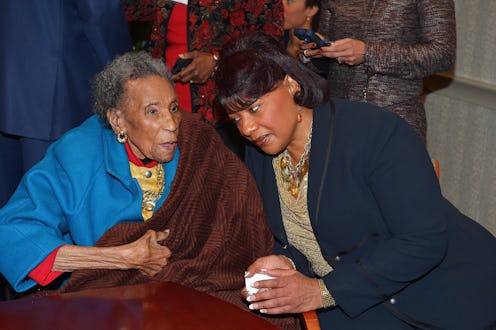News
This Video Shows Why Boynton Robinson Is A Hero
Amelia Boynton Robinson, the civil rights activist considered by many to be the matriarch of the voting rights movement in America, has died at the age of 104. It's not surprising if you've never heard of Robinson. She was one of the crucial figures in the Civil Rights Movement at a time when women's contributions to activism and social justice went largely unrecognized. Even though Robinson worked for civil rights and social justice for the majority of her life, her work — and that of other women, like Dorothy Height, Ella Baker, and Myrlie Evers — was often downplayed in favor of the achievements of male icons in the movement, like Martin Luther King, Jr. and Medgar Evers.
Some of Robinson's words live on — both in her autobiography, Bridge Across Jordan, and on the website of her human rights foundation, the Schiller Institute. But one interview, in which she reflects on the day in March 1965 that the world came to know as Bloody Sunday, is a great first step to understanding her role in the Civil Rights Movement. Here's how you can hear Amelia Boynton Robinson's perspective on Bloody Sunday, in an interview published by the National Visionary Leadership Project (NVLP), which shares the stories of African American elders who have changed the world.
It's thanks to the NVLP that we have such a clear record of Robinson's perspective. The organization is dedicated to preserving the oral histories of African Americans who lived through the struggle for civil rights in the 20th century. Why is that work important? In the case of Robinson, consider that she and her family were organizing voter registration drives in rural Alabama in the early 1930s, more than 30 years before the Voting Rights Act. And remember that fear of allowing blacks to vote came with beatings, harassment, and often murder. In 1965, Robinson helped organize the march from Selma to Montgomery — the protest that is widely credited as the tipping point in the passage of the Voting Rights Act. Without this incredible video footage, we'd hear little of Robinson's perspective in her own words. With her death this week, much of that feminist history and narrative would be left for others to tell.
Here is the video clip, available on the Visionary Project website and YouTube. In it, Robinson talks about the morning that she and 600 other protesters were beaten, gassed, and left for dead on the Edmund Pettus Bridge.
Her description — along with that of Congressman John Lewis — remains one of the most vivid accounts of what it was like to be part of Bloody Sunday and the 1965 Selma march. Robinson and hundreds of others sustained serious injuries after being beaten by Alabama state troopers on the bridge.
Still, the best takeaway from the video is Robinson's response to the interviewer's question about what being a victim of racial violence did to her emotionally. Even after facing death, the human rights activist said that she held no animosity for her attackers:
The only thing that I can see is pity. I feel sorry for them. [...] To think, to be stupid enough to think that they are superior because of the color of their skin, I feel sorry for them. And to this day, I feel sorry for racists. Because, it's ignorance, it's untraining, and it's unfortunate.
